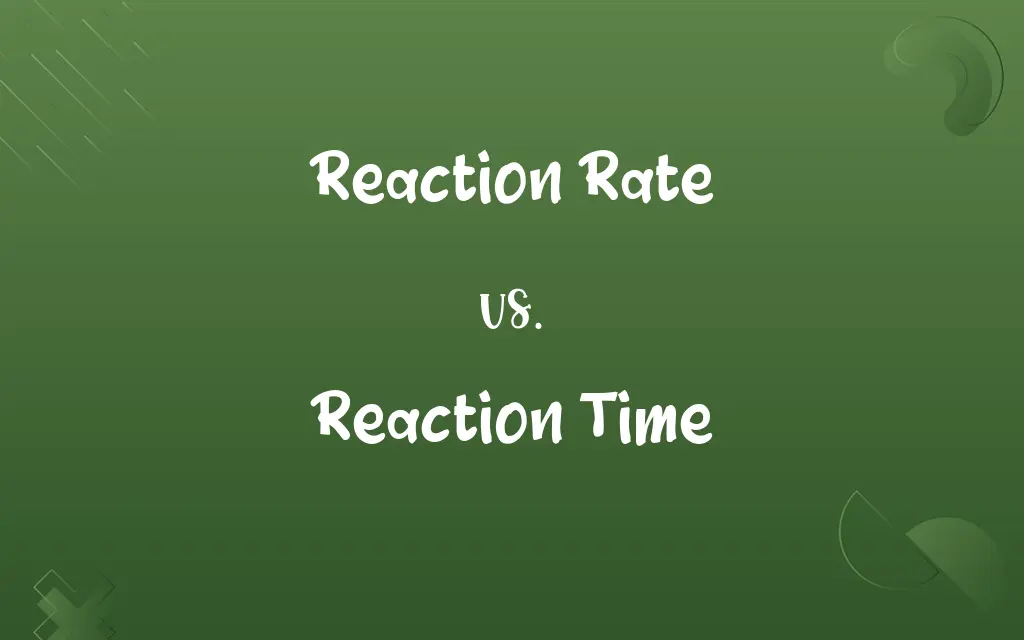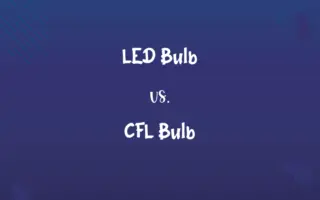Reaction Rate vs. Reaction Time: Know the Difference

By Shumaila Saeed || Published on January 15, 2024
Reaction Rate measures the speed at which reactants turn into products in a chemical reaction, while Reaction Time is the duration taken for a reaction to complete.

Key Differences
Reaction Rate quantifies how fast a chemical reaction proceeds, often measured in terms of change in concentration per unit time. Reaction Time, on the other hand, is the total duration from the start to the completion of a chemical reaction.
Shumaila Saeed
Jan 15, 2024
The units of Reaction Rate typically include moles per liter per second (mol/L/s), indicating the speed of reactant consumption or product formation. Reaction Time is measured in units of time such as seconds, minutes, or hours, marking the duration of the entire process.
Shumaila Saeed
Jan 15, 2024
Factors like temperature, pressure, and catalyst presence significantly affect the Reaction Rate by altering the speed of the reaction. The Reaction Time is influenced by the same factors, but these determine how long the reaction takes to reach completion.
Shumaila Saeed
Jan 15, 2024
Reaction Rate is crucial in understanding the kinetics of a reaction, helping in optimizing industrial processes. Reaction Time is more relevant in practical scenarios, such as determining the feasibility of a reaction for industrial or laboratory use.
Shumaila Saeed
Jan 15, 2024
In a concentration vs. time graph, Reaction Rate is represented by the steepness or slope of the curve, while Reaction Time is indicated by the point where the reaction curve levels off.
Shumaila Saeed
Jan 15, 2024
ADVERTISEMENT
Comparison Chart
Definition
Speed of reactant conversion to products
Total duration of a chemical reaction
Shumaila Saeed
Jan 15, 2024
Influencing Factors
Temperature, catalyst, concentration
Temperature, catalyst, reaction conditions
Shumaila Saeed
Jan 15, 2024
Importance in Chemistry
Understands reaction kinetics
Determines practical feasibility
Shumaila Saeed
Jan 15, 2024
Graphical Representation
Slope of concentration vs. time curve
Point where reaction curve levels off
Shumaila Saeed
Jan 15, 2024
ADVERTISEMENT
Reaction Rate and Reaction Time Definitions
Reaction Rate
Speed of a chemical reaction.
Increasing the temperature increased the reaction rate.
Shumaila Saeed
Jan 04, 2024
Reaction Time
Total time taken for a reaction process.
Varying the catalyst altered the reaction time significantly.
Shumaila Saeed
Jan 04, 2024
Reaction Rate
Measure of a reaction’s progress.
The experiment focused on comparing the reaction rates of different enzymes.
Shumaila Saeed
Jan 04, 2024
Reaction Time
Time from reaction start to end.
They measured the reaction time to determine efficiency.
Shumaila Saeed
Jan 04, 2024
Reaction Rate
Kinetic characteristic of a chemical reaction.
Studying the reaction rate helps in understanding the reaction mechanism.
Shumaila Saeed
Jan 04, 2024
ADVERTISEMENT
Reaction Time
Duration for a chemical reaction to complete.
The reaction time was prolonged under lower temperatures.
Shumaila Saeed
Jan 04, 2024
Reaction Rate
Change in concentration over time.
The reaction rate was determined by measuring the decrease in reactant concentration.
Shumaila Saeed
Jan 04, 2024
Reaction Time
Period from initiation to completion of a reaction.
The reaction time was critical for the experiment's success.
Shumaila Saeed
Jan 04, 2024
Reaction Rate
Rate of reactant consumption or product formation.
The catalyst significantly accelerated the reaction rate.
Shumaila Saeed
Jan 04, 2024
Reaction Time
Temporal length of a chemical process.
In industrial processes, minimizing reaction time is often a priority.
Shumaila Saeed
Jan 04, 2024
Repeatedly Asked Queries
What is Reaction Rate?
Reaction Rate measures how fast reactants are converted into products in a chemical reaction.
Shumaila Saeed
Jan 15, 2024
What is Reaction Time?
Reaction Time is the total time taken for a chemical reaction to complete.
Shumaila Saeed
Jan 15, 2024
How do you calculate Reaction Rate?
Reaction Rate is calculated as the change in concentration of a reactant or product per unit time.
Shumaila Saeed
Jan 15, 2024
What factors influence Reaction Time?
Reaction Time is influenced by reaction conditions, including temperature and catalysts.
Shumaila Saeed
Jan 15, 2024
Does temperature always decrease Reaction Time?
Generally, increasing temperature decreases Reaction Time, but it depends on the reaction.
Shumaila Saeed
Jan 15, 2024
How is Reaction Time determined?
Reaction Time is determined by measuring the duration from the start to the end of a reaction.
Shumaila Saeed
Jan 15, 2024
What affects the Reaction Rate?
Factors like temperature, concentration, and presence of catalysts affect the Reaction Rate.
Shumaila Saeed
Jan 15, 2024
Can Reaction Time vary in the same reaction?
Yes, Reaction Time can vary based on different reaction conditions and catalysts.
Shumaila Saeed
Jan 15, 2024
Is a higher Reaction Rate always better?
Not necessarily; it depends on the desired outcome of the reaction.
Shumaila Saeed
Jan 15, 2024
Does a short Reaction Time imply a fast Reaction Rate?
Often, but not always, as other factors like reaction mechanism can play a role.
Shumaila Saeed
Jan 15, 2024
How is Reaction Time useful in industry?
Reaction Time is important for the efficiency and feasibility of industrial processes.
Shumaila Saeed
Jan 15, 2024
What unit is used for Reaction Time?
Reaction Time is usually measured in seconds, minutes, or hours.
Shumaila Saeed
Jan 15, 2024
Why is Reaction Rate important in chemistry?
Understanding Reaction Rate is crucial for controlling and optimizing chemical processes.
Shumaila Saeed
Jan 15, 2024
How do pressure changes affect Reaction Rate?
For gases, increasing pressure usually increases the Reaction Rate.
Shumaila Saeed
Jan 15, 2024
Do all reactions have a measurable Reaction Time?
Yes, all chemical reactions have a measurable Reaction Time, though it can vary greatly.
Shumaila Saeed
Jan 15, 2024
Can Reaction Rate be zero?
Yes, if a reaction is at equilibrium, the Reaction Rate can be zero.
Shumaila Saeed
Jan 15, 2024
What unit is used for Reaction Rate?
Common units include moles per liter per second (mol/L/s).
Shumaila Saeed
Jan 15, 2024
How do catalysts affect Reaction Rate?
Catalysts increase Reaction Rate by lowering the activation energy of the reaction.
Shumaila Saeed
Jan 15, 2024
Can Reaction Rate be controlled?
Yes, by adjusting factors like temperature and reactant concentration.
Shumaila Saeed
Jan 15, 2024
Is a longer Reaction Time always undesirable?
Not necessarily; some reactions require a longer time for better product yield.
Shumaila Saeed
Jan 15, 2024
Share this page
Link for your blog / website
HTML
Link to share via messenger
About Author
Written by
Shumaila SaeedShumaila Saeed, an expert content creator with 6 years of experience, specializes in distilling complex topics into easily digestible comparisons, shining a light on the nuances that both inform and educate readers with clarity and accuracy.









































































